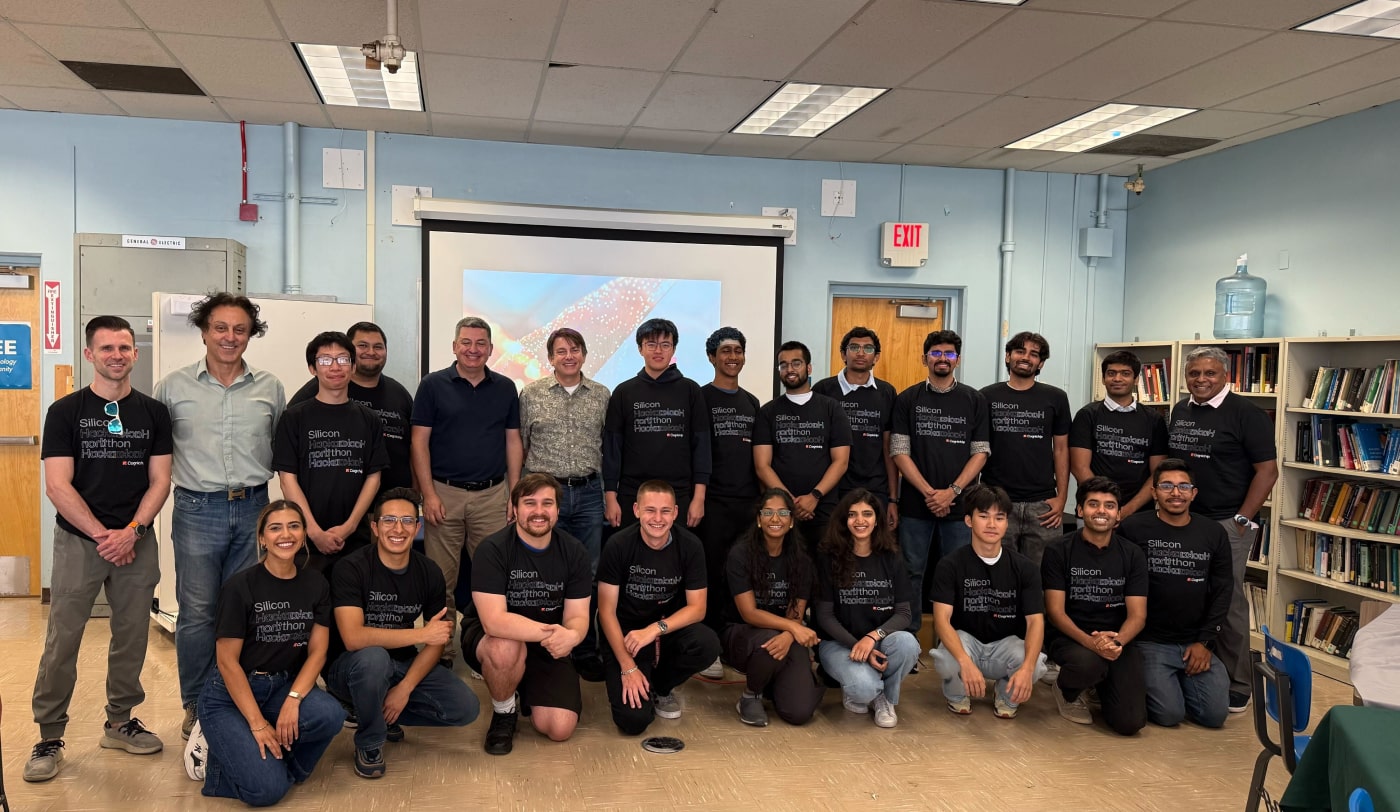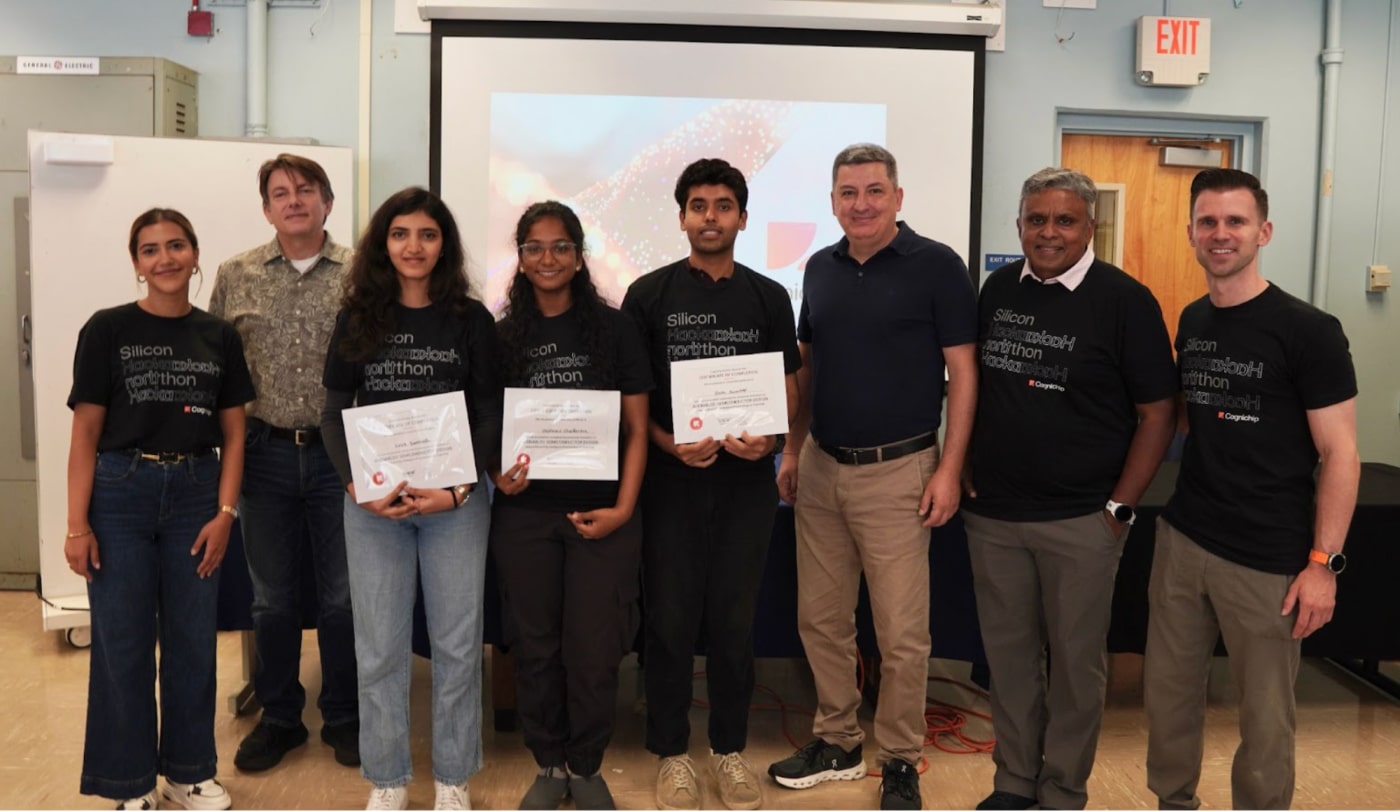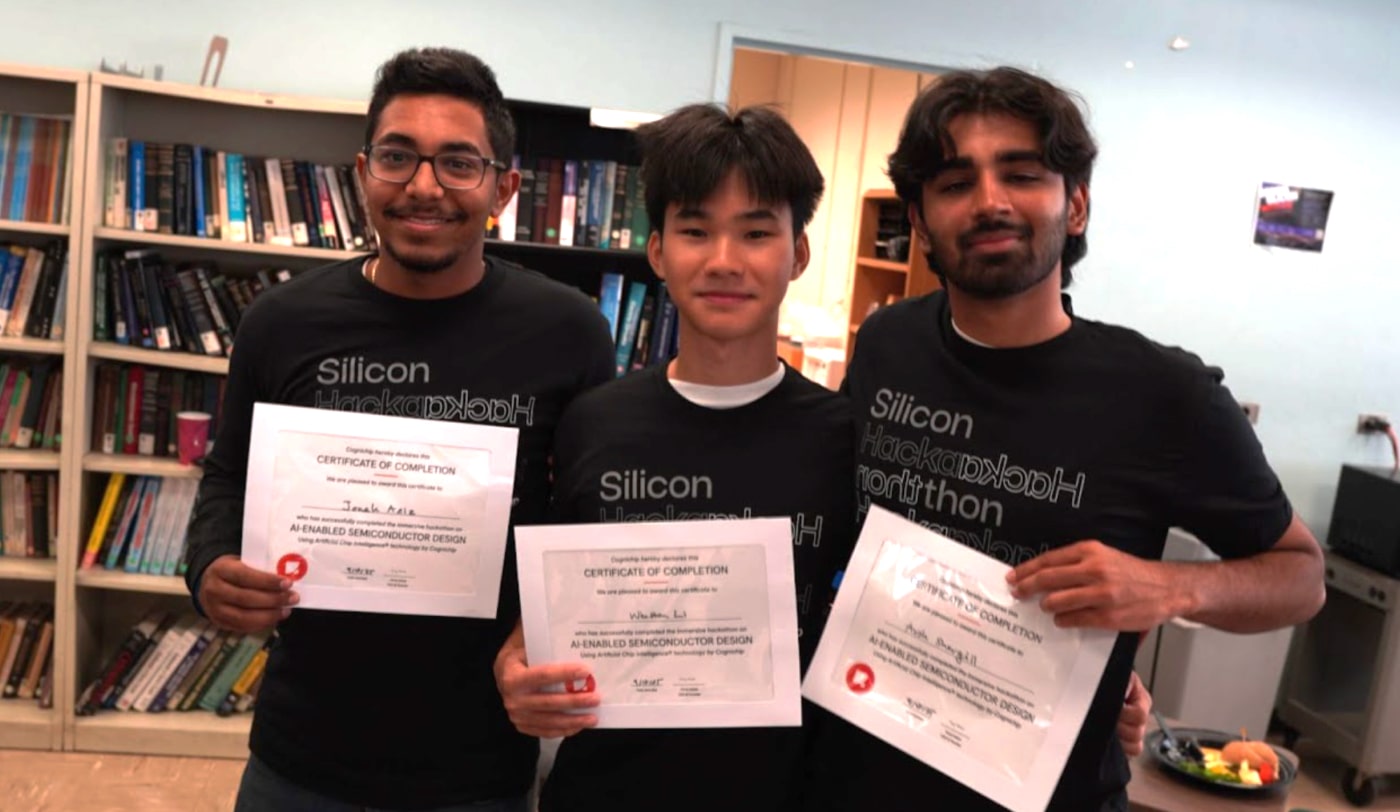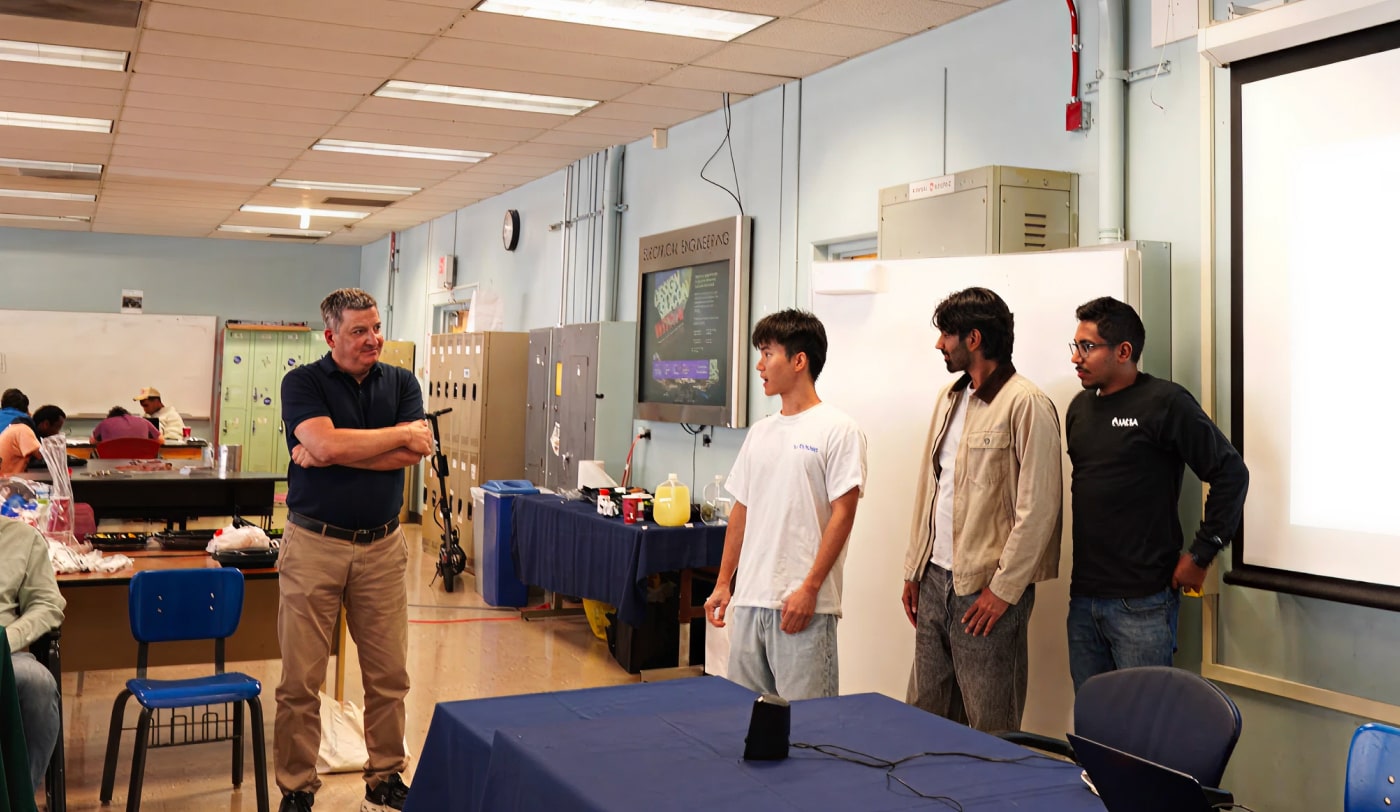“I asked AI for help with one module, and two minutes later it's generating SystemVerilog code, test benches, CML files, and even suggesting feature engineering strategies – like it's been waiting its whole life for this project.” – Parin Hemang Mistry, SJSU MSEE '26

61 hours. That’s all it took, on average, for student teams at San José State University to design new silicon from scratch using Cognichip’s Artificial Chip Intelligence (ACI®).
Earlier this year, our team asked: What if hackathons — long a staple of software and AI culture — became possible for chip designers?
Software engineers have endless opportunities to hack, and AI developers are spinning up their own competitions. But hardware?
For too long, chip design has been seen as slow, expensive, and inaccessible to the hardware-curious and broader developer community. Our first Cognichip Innovators Hackathon with SJSU’s IEEE chapter leadership and professors, set out to change that — breaking through status quo dynamics to create opportunities for early innovation among the next generation of chip designers.
“Going into this project, we believed students would significantly benefit from designing with our physics-informed AI foundational model. What surprised us was how quickly the students – as young as eighteen years old – were able to learn and start designing without a steep learning curve. They were not just following prompts but proposing their own projects, cutting loose their imagination, and taking ideas from zero to completed designs that might otherwise have taken months.
“The SJSU hackathon showcased the boundless creativity of our future generation of users and the innovative ways hardware can be hacked. Working with universities is a priority for Cognichip, and we are proud to recognize these accomplished students in our early user cohorts.” – Faraj Aalaei, Founder & CEO, Cognichip
At Cognichip, we believe chip design should be just as dynamic, collaborative, and creative as software development. Our mission is to lower barriers of time, cost, and access — proving that with AI, hardware innovation can happen in days, not years. That’s why we did this.
The challenge was simple: Dream big and use AI to help you get there, not in months but in weeks and even hours. Unlike a traditional 48-hour hackathon, this pilot program – through a team of Cognichip mentors – guided students over the course of several months from their original, creative proposals to successful completion. Each team proposed their own innovative projects, which were evaluated not just on technical outcomes but on their scope, methodology, creative use of AI, and quality of deliverables.
We began by visiting the university’s IEEE chapter to introduce Cognichip and share our vision for AI-enabled chip design; that first touchpoint sparked curiosity and spread the word. Students then crafted and submitted proposals, which our team reviewed and provided feedback on, helping them refine their ideas before diving into development.
From there, we hosted a quick training session – answering questions and ensuring everyone felt equipped for the challenge ahead. Next, it was time to start hacking and turn proposals into working hardware designs!
Over the course of the next few weeks, teams collaborated virtually, held office hours and live Q&As, and iterated on solutions with the support of Cognichip mentors. The extended format allowed for deeper exploration, more refined projects, and the chance for students to experience what real-world chip design looks like — guided by physics-informed AI.
Participants proposed a range of challenges from Smart DRAM subsystems, BioSensor AI, image processing and object recognition, amplifier circuits, CPUs, and so much more. Ultimately, the students’ ambition and execution in their custom designs completely exceeded our expectations.
First Place: Team OoO-Rigami — Created a pipelined RISC-V CPU, with added SIMD instructions and custom CNN Accelerator.

Second Place: Team Zero-RISC — Built a RISC-V CPU from scratch and characterized several branch prediction algorithms.

Third Place: Parin Hemang Mistry (solo hacker) — Vibe-chipped an ML-accelerated network packet classifier.

“Unlike the abundance of software competitions, hardware opportunities like this are rare, which made the event all the more meaningful. It pushed us to stretch our chip design skills while giving us a chance to collaborate and learn from the Cognichip team along the way," – said Team OoO-Rigami’s Vaishnavi Chadaram, Shiva Swaroop Kumaraswamy, and Kruti Santhosh.
“Instead of traditional workflows, we were introduced to a groundbreaking idea: using AI to design and synthesize chips. This technology is only just beginning to reach the market, and having the chance to experiment with it was different, exciting, and eye-opening.” they continued.
"Our team, Zero-RISC, had an amazing experience participating in this hackathon. As this was our first chip design hackathon, we learned so much over the past few months and grew tremendously through the process. We’re grateful to have earned second place, and we’re excited to carry this experience forward into future projects.” – Team Zero-RISC’s Arsh Shergill, Winston Li, and Jonah Aziz.
“The performance of Cognichip during the hackathon was outstanding. From the first day to the last, the difference was remarkable. Cognichip’s AI empowered us to explore and learn new concepts throughout the journey, while connecting with an amazing community of innovators, helping me grow both technically and creatively.” – Parin Hemang Mistry.
For many students, this was their first hardware + AI hackathon — and the experience proved to have an impact beyond their academic interests. Participants added it to résumés, discussed it at career fairs, and shared how it gave them tangible, hands-on experience to showcase with employers.
The scale of what they achieved was equally striking. Using Cognichip’s physics-informed AI, student teams collectively produced:
— 27,500+ lines of RTL created
— 373 tests simulated
— 3,000+ queries answered
— 305 hours of collaboration

“I was thrilled to see SJSU students shine at the Cognichip AI Hardware Hackathon! Their creativity, teamwork, and technical rigor made this a truly inspiring event. I am grateful to Cognichip for partnering with us to empower the next generation of chip designers.” – San José State University Electrical Engineering Professor Sotoudeh Hamedi-Hagh.
“This is why I teach at SJSU. What a great event and showcase of our student work.” – San José State University Electrical Engineering Professor David Parent shared on LinkedIn following our awards ceremony for our hackathon participants.
“The Cognichip Hackathon was an invaluable experience for our students at San Jose State University. It allowed them to apply the practical skills honed in their academic coursework while discovering how AI drives greater efficiency and innovation. Throughout the event, the Cognichip team’s guidance was exceptional and incredibly supportive,” sharedSJSU IEEE Chapter President Atiskh Rao.
“They really took time out of their day to help the students with their creative designs and contribute to their success. We thank Cognichip sincerely for providing this opportunity for our students and are looking forward to collaborating again soon!” Rao continued.
These results demonstrated how quickly young engineers, using ACI®, can move from ideas to real hardware design — in days, not months.
Some big lessons stood out:
1. AI lowers barriers. By embedding AI into chip design, we enabled participants from different backgrounds to contribute meaningfully.
2. Collaboration is amplified. Just as in software hackathons, there are serious benefits to teaming up with colleagues, mentors, or with AI itself.
3. Human creativity x AI power = acceleration. The hackathon showed how quickly imagination can become reality when student ingenuity is paired with a physics-informed AI.
4. Hardware can be hacked. With advanced, AI-enabled technology, frameworks, and mindsets, the old barriers of chip design are being chipped away.
This hackathon was more than a competition. It was a glimpse into the future of hardware innovation: faster, more accessible, and accelerated by Cognichip’s physics-informed AI. And we are confident in the playbook we’ve built – informed by feedback from the students and colleagues.
We’re grateful to our participants, mentors, and partners for making the first Cognichip Innovators Hackathon a success.
Sixty-one hours was just the beginning. Stay tuned - hardware can hack, too.